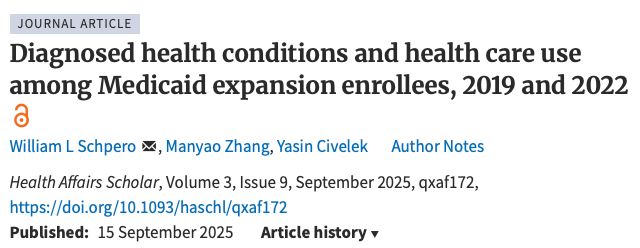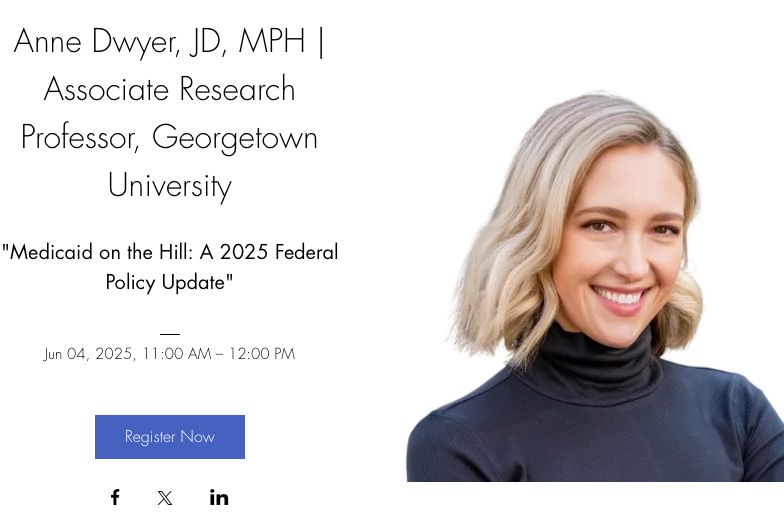
William Schpero
@wschpero.bsky.social
Assistant professor @weillcornell.bsky.social. Health economist studying Medicaid, the health care safety net, and inequity.
Website: williamschpero.com
Website: williamschpero.com
We are excited today to launch the T-MSIS Analytic Files (TAF) Analysis Reporting Checklist, which is designed to guide reporting of research using the TAF, the new generation Medicaid claims data.
See @jamahealthforum.com: jamanetwork.com/journals/jam...
Links to resources in thread below ⬇️
1/N
See @jamahealthforum.com: jamanetwork.com/journals/jam...
Links to resources in thread below ⬇️
1/N

October 24, 2025 at 3:34 PM
We are excited today to launch the T-MSIS Analytic Files (TAF) Analysis Reporting Checklist, which is designed to guide reporting of research using the TAF, the new generation Medicaid claims data.
See @jamahealthforum.com: jamanetwork.com/journals/jam...
Links to resources in thread below ⬇️
1/N
See @jamahealthforum.com: jamanetwork.com/journals/jam...
Links to resources in thread below ⬇️
1/N
For many years, the Clark Center at Chicago Booth has regularly surveyed leading economists to assess consensus on timely economic policy issues.
We are excited today to launch the Cornell Health Policy Insight Panel, where we extend that model to health policy.
1/N ⬇️
We are excited today to launch the Cornell Health Policy Insight Panel, where we extend that model to health policy.
1/N ⬇️

September 30, 2025 at 1:54 PM
For many years, the Clark Center at Chicago Booth has regularly surveyed leading economists to assess consensus on timely economic policy issues.
We are excited today to launch the Cornell Health Policy Insight Panel, where we extend that model to health policy.
1/N ⬇️
We are excited today to launch the Cornell Health Policy Insight Panel, where we extend that model to health policy.
1/N ⬇️
➡️ Key Finding 2: There was meaningful variation in health care use across states.
Rx use exhibited the largest variation across states, followed by outpatient visits, ED visits, and inpatient visits.
3/N
Rx use exhibited the largest variation across states, followed by outpatient visits, ED visits, and inpatient visits.
3/N

September 18, 2025 at 2:11 PM
➡️ Key Finding 2: There was meaningful variation in health care use across states.
Rx use exhibited the largest variation across states, followed by outpatient visits, ED visits, and inpatient visits.
3/N
Rx use exhibited the largest variation across states, followed by outpatient visits, ED visits, and inpatient visits.
3/N
➡️ Key Finding 1: In 2022, over one-third of adult expansion enrollees had at least 1 diagnosed health condition.
One-quarter had an ED visit, while over 60% had outpatient visits and prescription drug fills.
2/N
One-quarter had an ED visit, while over 60% had outpatient visits and prescription drug fills.
2/N

September 18, 2025 at 2:11 PM
➡️ Key Finding 1: In 2022, over one-third of adult expansion enrollees had at least 1 diagnosed health condition.
One-quarter had an ED visit, while over 60% had outpatient visits and prescription drug fills.
2/N
One-quarter had an ED visit, while over 60% had outpatient visits and prescription drug fills.
2/N
During debate on the OBBBA, I realized we know very little about health care needs and use in the adult Medicaid expansion population.
We have a short paper out in Health Affairs Scholar this week that uses national Medicaid claims data in an attempt to fill that gap:
⬇️ 1/N
We have a short paper out in Health Affairs Scholar this week that uses national Medicaid claims data in an attempt to fill that gap:
⬇️ 1/N

September 18, 2025 at 2:11 PM
During debate on the OBBBA, I realized we know very little about health care needs and use in the adult Medicaid expansion population.
We have a short paper out in Health Affairs Scholar this week that uses national Medicaid claims data in an attempt to fill that gap:
⬇️ 1/N
We have a short paper out in Health Affairs Scholar this week that uses national Medicaid claims data in an attempt to fill that gap:
⬇️ 1/N
Very excited to moderate a conversation next Wed with Anne Dwyer from the Georgetown Center for Children and Families.
The goal: make sense of all that's happening re: Medicaid on the Hill.
Register for the next Medicaid Insights Colloquium below:
us06web.zoom.us/webinar/regi...
The goal: make sense of all that's happening re: Medicaid on the Hill.
Register for the next Medicaid Insights Colloquium below:
us06web.zoom.us/webinar/regi...

May 28, 2025 at 1:08 PM
Very excited to moderate a conversation next Wed with Anne Dwyer from the Georgetown Center for Children and Families.
The goal: make sense of all that's happening re: Medicaid on the Hill.
Register for the next Medicaid Insights Colloquium below:
us06web.zoom.us/webinar/regi...
The goal: make sense of all that's happening re: Medicaid on the Hill.
Register for the next Medicaid Insights Colloquium below:
us06web.zoom.us/webinar/regi...
from the paper. Full notes:

May 5, 2025 at 5:29 PM
from the paper. Full notes:
Important, timely new findings on the effects of Medicaid expansion under the ACA from Wyse and Meyer (Dartmouth):
1. *Lives saved*: 21% reduction in the mortality hazard of new enrollees.
2. *Cost-effective*: $179,000 per life-year saved.
Read more: www.nber.org/papers/w33719
1. *Lives saved*: 21% reduction in the mortality hazard of new enrollees.
2. *Cost-effective*: $179,000 per life-year saved.
Read more: www.nber.org/papers/w33719

May 5, 2025 at 1:59 PM
Important, timely new findings on the effects of Medicaid expansion under the ACA from Wyse and Meyer (Dartmouth):
1. *Lives saved*: 21% reduction in the mortality hazard of new enrollees.
2. *Cost-effective*: $179,000 per life-year saved.
Read more: www.nber.org/papers/w33719
1. *Lives saved*: 21% reduction in the mortality hazard of new enrollees.
2. *Cost-effective*: $179,000 per life-year saved.
Read more: www.nber.org/papers/w33719
In a new Health Affairs Scholar paper led by Steph Teeple, we begin to unpack the enormous rise in hospital assets we've seen in recent years.
A few key facts:
1. Total assets held by US hospitals more than doubled 2000-2019, from $750 billion to $1.6 trillion.
A few key facts:
1. Total assets held by US hospitals more than doubled 2000-2019, from $750 billion to $1.6 trillion.

February 7, 2025 at 5:58 PM
In a new Health Affairs Scholar paper led by Steph Teeple, we begin to unpack the enormous rise in hospital assets we've seen in recent years.
A few key facts:
1. Total assets held by US hospitals more than doubled 2000-2019, from $750 billion to $1.6 trillion.
A few key facts:
1. Total assets held by US hospitals more than doubled 2000-2019, from $750 billion to $1.6 trillion.
Happening at 1PM today!
Come hear Jenny Kenney for post-election thoughts on where Medicaid research needs to go.
us06web.zoom.us/webinar/regi...
Come hear Jenny Kenney for post-election thoughts on where Medicaid research needs to go.
us06web.zoom.us/webinar/regi...

December 11, 2024 at 5:25 PM
Happening at 1PM today!
Come hear Jenny Kenney for post-election thoughts on where Medicaid research needs to go.
us06web.zoom.us/webinar/regi...
Come hear Jenny Kenney for post-election thoughts on where Medicaid research needs to go.
us06web.zoom.us/webinar/regi...
iHEA is accepting nominations for the annual student paper prize through January 18.
This is a great opportunity to recognize fantastic work by early career researchers.
Details here: healtheconomics.org/awards/
This is a great opportunity to recognize fantastic work by early career researchers.
Details here: healtheconomics.org/awards/

December 22, 2023 at 2:39 PM
iHEA is accepting nominations for the annual student paper prize through January 18.
This is a great opportunity to recognize fantastic work by early career researchers.
Details here: healtheconomics.org/awards/
This is a great opportunity to recognize fantastic work by early career researchers.
Details here: healtheconomics.org/awards/
Medicaid policy folks:
Our next Medicaid Insights Colloquium is set for December 13.
Very excited to welcome Chima Ndumele (@YaleHPM), moderated by @povertyscholar.bsky.social (@CornellBPP).
Register here:
us06web.zoom.us/webinar/regi...
Our next Medicaid Insights Colloquium is set for December 13.
Very excited to welcome Chima Ndumele (@YaleHPM), moderated by @povertyscholar.bsky.social (@CornellBPP).
Register here:
us06web.zoom.us/webinar/regi...

December 1, 2023 at 5:03 PM
Medicaid policy folks:
Our next Medicaid Insights Colloquium is set for December 13.
Very excited to welcome Chima Ndumele (@YaleHPM), moderated by @povertyscholar.bsky.social (@CornellBPP).
Register here:
us06web.zoom.us/webinar/regi...
Our next Medicaid Insights Colloquium is set for December 13.
Very excited to welcome Chima Ndumele (@YaleHPM), moderated by @povertyscholar.bsky.social (@CornellBPP).
Register here:
us06web.zoom.us/webinar/regi...
Happy @ashecon abstract deadline extension day to all who celebrate!
(Dec 11 now)
(Dec 11 now)

November 29, 2023 at 2:38 PM
Happy @ashecon abstract deadline extension day to all who celebrate!
(Dec 11 now)
(Dec 11 now)
3. Investment in enrollment processes (e.g., ex parte renewals) did not necessarily correlate w/ better denial rates.
But, keep in mind: (i) our N was 13; and (ii) it could be that states with higher denial rates ex ante were then more likely to invest in ex parte renewals.
7/N
But, keep in mind: (i) our N was 13; and (ii) it could be that states with higher denial rates ex ante were then more likely to invest in ex parte renewals.
7/N

November 17, 2023 at 4:12 PM
3. Investment in enrollment processes (e.g., ex parte renewals) did not necessarily correlate w/ better denial rates.
But, keep in mind: (i) our N was 13; and (ii) it could be that states with higher denial rates ex ante were then more likely to invest in ex parte renewals.
7/N
But, keep in mind: (i) our N was 13; and (ii) it could be that states with higher denial rates ex ante were then more likely to invest in ex parte renewals.
7/N
2. Wide variation in denial rates.
In certain states, more than 1 in 4 Medicaid determinations and 1 in 3 CHIP determinations resulted in ineligibility solely for procedural reasons; in others, procedural denials were close to 0.
6/N
In certain states, more than 1 in 4 Medicaid determinations and 1 in 3 CHIP determinations resulted in ineligibility solely for procedural reasons; in others, procedural denials were close to 0.
6/N

November 17, 2023 at 4:12 PM
2. Wide variation in denial rates.
In certain states, more than 1 in 4 Medicaid determinations and 1 in 3 CHIP determinations resulted in ineligibility solely for procedural reasons; in others, procedural denials were close to 0.
6/N
In certain states, more than 1 in 4 Medicaid determinations and 1 in 3 CHIP determinations resulted in ineligibility solely for procedural reasons; in others, procedural denials were close to 0.
6/N


